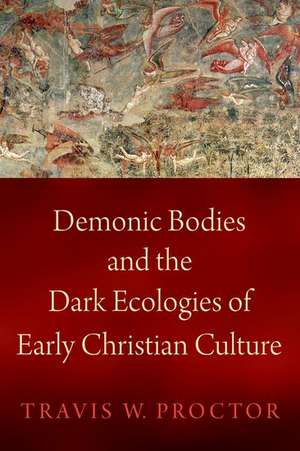Demonic Bodies and the Dark Ecologies of Early Christian Culture
Autor Travis W. Proctoren Limba Engleză Hardback – 11 iul 2022
Preț: 704.31 lei
Preț vechi: 869.52 lei
-19% Nou
Puncte Express: 1056
Preț estimativ în valută:
134.77€ • 141.09$ • 111.51£
134.77€ • 141.09$ • 111.51£
Carte disponibilă
Livrare economică 15-29 martie
Preluare comenzi: 021 569.72.76
Specificații
ISBN-13: 9780197581162
ISBN-10: 0197581161
Pagini: 288
Dimensiuni: 229 x 152 x 28 mm
Greutate: 0.54 kg
Editura: Oxford University Press
Colecția OUP USA
Locul publicării:New York, United States
ISBN-10: 0197581161
Pagini: 288
Dimensiuni: 229 x 152 x 28 mm
Greutate: 0.54 kg
Editura: Oxford University Press
Colecția OUP USA
Locul publicării:New York, United States
Recenzii
Travis Proctor's exciting and innovative book shows how early Christians diversely constructed the bodies of demons as a means of defining and limiting their own bodies and the bodies of their worshiping communities. It not only contributes significantly to New Testament and early Christian studies, but it also advances cutting-edge conversations in the humanities concerning religion and posthumanism.
This theoretically informed treatment of demonic bodies draws our attention to the often-overlooked cosmic ecology in which early Christians were enmeshed. Proctor fleshes out the non-human actors who populated the Christian universe and offers an ecological reading that brims with relevance for our modern environmental thinking.
Travis Proctor's Demonic Bodies is a fascinating and original work, one that will be of interest to many scholars of early Christian ideas on demons and the body. Its sophisticated analysis of numerous early Christian texts using the lens of disability, ecological, and post-humanist studies makes an important contribution to the field. His overarching argument that regardless of whether ancient thinkers argued for the incorporeality/immateriality of demons or for their embodiment, the development of their arguments were inseparable from their development of early Christian anthropologies is a compelling one.
Demonic Bodies is exceptionally well researched and well written. I warmly recommend it to anyone interested in the cultural and religious history of the ancient world.
This theoretically informed treatment of demonic bodies draws our attention to the often-overlooked cosmic ecology in which early Christians were enmeshed. Proctor fleshes out the non-human actors who populated the Christian universe and offers an ecological reading that brims with relevance for our modern environmental thinking.
Travis Proctor's Demonic Bodies is a fascinating and original work, one that will be of interest to many scholars of early Christian ideas on demons and the body. Its sophisticated analysis of numerous early Christian texts using the lens of disability, ecological, and post-humanist studies makes an important contribution to the field. His overarching argument that regardless of whether ancient thinkers argued for the incorporeality/immateriality of demons or for their embodiment, the development of their arguments were inseparable from their development of early Christian anthropologies is a compelling one.
Demonic Bodies is exceptionally well researched and well written. I warmly recommend it to anyone interested in the cultural and religious history of the ancient world.
Notă biografică
Travis W. Proctor is Assistant Professor of Religion at Wittenberg University. His research has appeared in academic journals such as the Journal of Early Christian Studies, Harvard Theological Review, and Journal of Ecclesiastical History, as well as public venues including Religion Dispatches, The Bart Ehrman Blog, and the “Tell Me Something I Don't Know” podcast. His work has garnered numerous awards, including from the Society of Biblical Literature and the Research Center for International and Interdisciplinary Theology at Heidelberg University.
